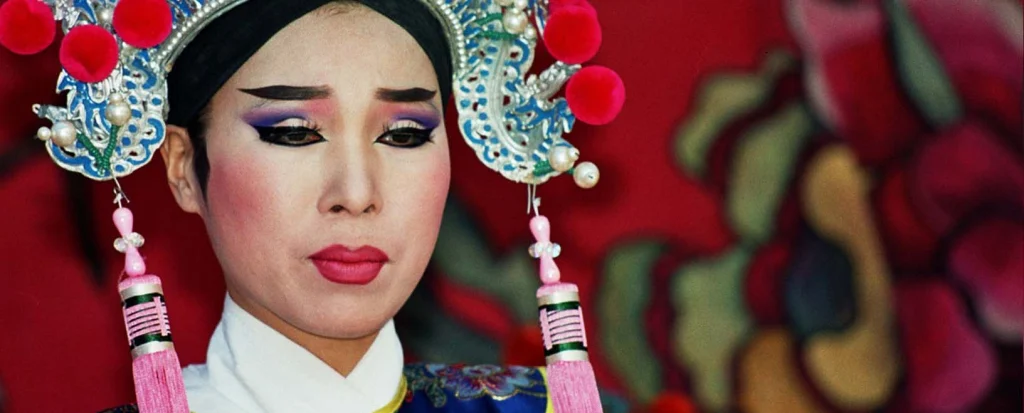A beautiful woman, unfurls the pearly curtain
Quietly sitting, how troubled her brow
I see the tears now, glistening on her cheeks
Still I don’t know who she hates.
Love and Hate
Love, it is said, is the strongest emotion. But hate must be a close second.
Li Bai sees a beautiful woman with tear stained cheeks, but not the bitter hate she feels. A beautiful woman unfurls a pearly curtain but not her feelings. It is a great prompt for a story.
Who does she bitterly hate? Will she get revenge?
Notes on Translation
Yuàn Qíng, the title is a bit tricky in English. Grudge, if you are looking for one word, Bitter love is more popular choice, literally, one comes up with blame the passion, which doesn’t quite fit.
Měirén, a beautiful woman. Line 2, é méi moth eyebrow, a euphemism for a beauty, which originates in the shape of the eybrows which resemble those of a moth. Last line, Bùzhī, unknown, xīn hèn shuí, who she hates, or, what she feels in her heart.
Pinyin and Chinese Characters
Yuàn Qíng
měirén juàn zhū lián
shēn zuò pín é méi
dàn jiàn lèi hén shī
búzhī xīn hèn shuí
怨情
美人捲珠簾
深坐蹙蛾眉
但見淚痕濕
不知心恨誰
怨情
李白 〔唐代〕
美人卷珠帘,深坐蹙蛾眉。(蹙 一作:颦)
但见泪痕湿,不知心恨谁。
译文及注释
译文
美人儿卷起珠帘一直等待,一直坐着把双眉紧紧锁闭。
只看见她泪痕湿满了两腮,不知道她心中埋怨的是谁?
注释
“深坐”句:写失望时的表情。
深坐:久久呆坐。
蹙蛾眉:皱眉。
赏析
五言绝句:语言平浅简易,情态缠绵凄凉,含蓄蕴藉,言短意长。“含蓄有古意”、“直接国风之遗”,在理解李白诗歌的时候应该注意这些。古代的“美人”就不是一个普通的词,与现代口头时髦的“美女”很不一样。《离骚》里的“香草美人”指贤臣明君;《诗经》中的美人指容德俱美的年轻女子,“有美一人,清扬婉兮”。“美人卷珠帘”是指品性容貌都美好的闺中女子,李白诗歌的“含蓄蕴藉”是指诗歌中主人公情韵的婉转,而非指寄托兴寓,所以说它“直接国风之遗”。
这首小诗抒写一位美人的幽怨,不直截了当地写怨,而只作美人神态的描绘:含颦独坐,泪痕满面,却表现出了她心中深深的愁恨。
“深坐颦蛾眉”,“深”的意思是有多层的。“庭院深深深几许,杨柳堆烟,帘幕无重数。”(欧阳修《蝶恋花》)女子所住的闺房在“帘幕无重数”的深院里,十分幽深,十分寂寞,这是第一层;“深”还有深情的意思,所谓“美人卷珠帘”,古人思念亲人,总要登高望远,那是男子的做法,女子“养在深闺人未识”,不能抛头露面,于是只好“卷珠帘”望着离人去的方向以寄托思念之情,期待离人回来,这是第二层;“深”的第三层意思便是“久”,指坐的时间很长了。颦是皱的意思,吴宫里的西施“颦”起来的样子比平日更加美丽,更加楚楚可怜,才有了东施的效颦。“颦蛾眉”更显出了“美人”之美。
“但见泪痕湿”,因为思念太深了,情太深了,所以不知不觉就流下相思泪。“湿”字说明是暗暗地流泪,情不自禁地流泪。联系到第二句的“颦蛾眉”,比“才下眉头,又上心头”的怨情更重。
“不知心恨谁”,明明是思念,是爱一个人,却偏偏用“恨”。女主人公的心底是有点抱怨,离人去外地太久了,害她一个人在这深院里忍受着孤单寂寞,离人却还不回来。但这种恨,其实就是一种爱。爱一个人,总是恨对方不能陪伴在身边。诗的前三句用赋,末尾用问句归结“怨情”。这里的赋是个动态的过程,首先是“卷珠帘”,然后“深坐”,再“颦蛾眉”,最后“泪痕湿”,行动可见,情态逼人。
这首诗的最后两句,历来为人称道。明明是思念,是爱一个人,却用了一个“恨”,所谓恨,是爱之极也。明明思念的对象已经呼之欲出了,却就不知恨谁。这两句,可以从两个视角来解读。第一个视角,是美人的视角,美人不是恨谁,是恨这春光太美,勾引了她内心的思念,还是恨良人久离不归,让她独守空房?恨的模糊了,但美人内心的恨意,却是明确的。第二个视角,是诗人的视角,诗人是一个旁观者的角度,看到一个脸上挂着泪痕的美女,看到了她内心的恨意,但是不知道她恨的对象,也不敢冒昧问。
李白的这首诗写的就是一个意境,一个孤独的女子的思念之情。这样一个很平凡的情景,作者捕捉到了几个点,由这几个点勾出一幅简单的画面,同时又留下无限的遐想。随意的一个小细节,就可以泄露整个主题,可见诗人的洞察力。全诗哀婉凄凉,缠绵悱恻。▲
Five character quatrain: the language is simple and plain, the mood is lingering and desolate, implicit and profound, and the words are short and the meaning is long. We should pay attention to these when we understand Li Bai’s poems, which are “implicit with ancient meaning” and “direct legacy of national style”. The ancient “beauty” is not an ordinary word, which is very different from the modern oral fashionable “beauty”. “Vanilla Beauty” in Li Sao refers to a wise minister and a wise gentleman; The beauty in the Book of Songs refers to a young woman who is both beautiful and virtuous. The “beauty rolling bead curtain” refers to the boudoir women with beautiful character and appearance. The “implication” in Li Bai’s poetry refers to the euphemism of the main character’s sentiment in the poetry, not to the repose of the poem, so it is said to be “a direct legacy of national style”.
This little poem describes a beauty’s deep sorrow and hatred. It does not directly describe her sorrow, but only depicts her beauty’s manner: sitting alone with frown and tears all over her face, showing her deep sorrow and hatred in her heart.
“Sit deep and frown”, “deep” means multi-layer. “The courtyard is deep, willows stack smoke, and the curtain is not heavy.” (Ouyang Xiu’s Butterfly Loves Flowers) The boudoir where the woman lives is in the deep courtyard with “no multiple curtains”. It is very quiet and lonely. This is the first floor; “Deep” also means deep feelings. The so-called “beauty rolling bead curtain” means that the ancients always wanted to look far and high when missing their relatives, which was the practice of men. Women “kept in purdah” and could not be seen in public, so they had to “roll bead curtain” to look at the direction of leaving to express their feelings of missing and look forward to leaving. This is the second layer; The third meaning of “deep” is “long”, which means sitting for a long time. To frown means to wrinkle. Xi Shi in the Wu Palace “frowned” more beautiful and pitiful than usual, so she imitated Dong Shi. “Frowning” shows the beauty of “beauty”.
“But the tears are wet”, because the yearning is too deep, the feeling is too deep, so I unconsciously shed tears of acacia. The word “wet” means to weep secretly and uncontrollably. The “frowning” related to the second sentence is more serious than the “only frowning, but also on the heart” complaint.
“I don’t know who I hate”. It’s clearly missing and loving someone, but I just use “hate”. The heroine complains from the bottom of her heart that she has been away from home for too long, which makes her suffer loneliness alone in this deep courtyard, but she still doesn’t come back after leaving. But this kind of hate is actually a kind of love. Love a person, always hate each other can not accompany. The first three sentences of the poem use Fu, and the end uses questions to summarize “grievances”. The fu here is a dynamic process, first “rolling bead curtain”, then “deep sitting”, then “frowning”, finally “wet tears”. The action is visible and the attitude is compelling.
The last two sentences of this poem have always been praised by people. Obviously, it is missing and loving someone, but it uses a “hate”. The so-called hate is the extreme of love. It’s clear that the object of yearning is ready to come out, but I don’t know who I hate. These two sentences can be interpreted from two perspectives. The first perspective is the beauty’s perspective. Does the beauty hate who? Does she hate the beautiful spring scenery, which seduces her inner thoughts, or does she hate her lover for not coming back and leaving her alone? The hatred is vague, but the hatred inside the beauty is clear. The second perspective is the poet’s perspective. The poet is an onlooker. He sees a beautiful woman with tears on her face, sees her hatred, but does not know who she hates, and dare not venture to ask.
Li Bai’s poem is about an artistic conception, the yearning of a lonely woman. In such an ordinary scene, the author captures several points, and draws a simple picture from these points, while leaving infinite reverie. A casual little detail can reveal the whole theme, which shows the poet’s insight. The whole poem is sad and sad. ▲












